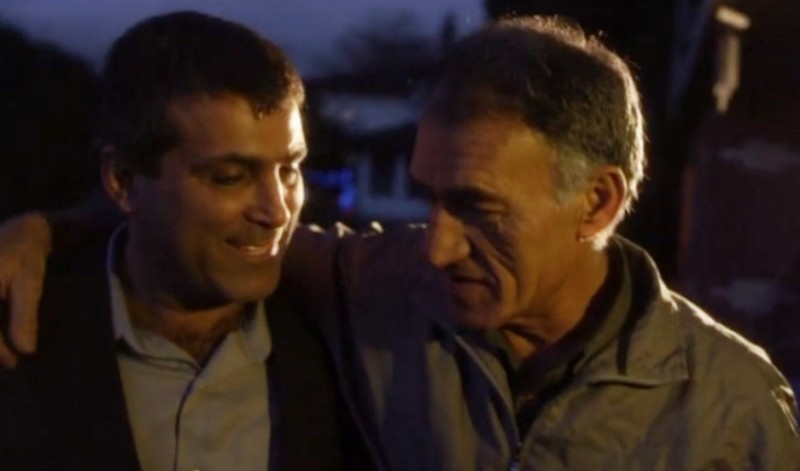
Zahed Haftlang (L) and Najah Aboud. Credit: Screengrab/Fathom Film Group
This article and radio report by Shirin Jaafari for The World originally appeared on PRI.org on May 28, 2015, and is republished here as part of a content-sharing agreement.
They were two recruits on opposite sides of a bloody 1980s war. One was instructed to kill the other, but he could not. Decades later, that grace would become useful — and is the subject of a new film.
Their paths crossed in the battle of Khorramshahr, when Iran's Zahed Haftlang found Iraq's Najah Aboud critically injured in a bunker. Haftlang had been ordered to kill any enemy soldiers he found. “But when he saw a photo of Najah's wife and son in his [Aboud's] pocket, he couldn't bring himself to shoot him,” explains Ann Shin, the documentary filmmaker behind “My Enemy, My Brother.”
Instead, Haftlang spared Aboud's life.
Both men spent time as prisoners of war. Haftlang was a prisoner of war for 17 years, until 2002.
Shin says the two had “lived parallel lives.” Haftlang suffered from PTSD and, after bouncing from job to job, ended in the merchant marine. During one trip at sea, he got into an argument. “He smashed something in the ship that he was on and the captain said, ‘You are going to be jailed once you get back home,'” Shin says.
Haftlang could not bear the thought of spending more time in prison. He jumped ship in Vancouver. “He was very depressed … he attempted suicide,” Shin says.
He visited a counseling center called VAST, Vancouver Association for the Survivors of Torture. Sitting in the waiting room, by coincidence, was Aboud. They didn't recognize each other, but struck up a conversation about Iran and Iraq that eventually turned to the war, in which hundreds of thousands of people were killed.
“One fellow goes, ‘Oh, were you in the war, too?’ ‘Yeah, I was in the battle of Khorramshahr,’ and he goes, ‘Yeah, I was there, too,'” says Shin.
Both suddenly realized that Haftlang was the young man who had saved Aboud's life. “They started shouting and they were so emotional that the counselors at the center thought…there's a fight breaking out in the waiting room,” says Shin.
Not a fight — just total disbelief. And wonder.
Since that day, Haftlang and Aboud have become close. Here's how close: Haftlang recently underwent an operation to remove a piece of shrapnel that was still lodged in his throat. Aboud was at his bedside. “Najah was saying, ‘You are my angel, you saved me 20 years ago, now, whatever I can do for you is nothing,'” says Shin.
Shin, who hopes to make a feature-length movie about them, says they both hope to return to their homelands. Aboud plans to search for his wife and son, missing since the war. Haftlang wants to visit his father, who has recently been diagnosed with cancer.






